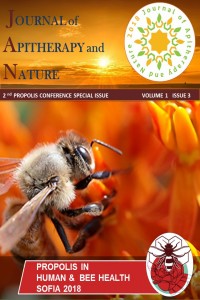Abstract
The need to Propolis is a Acknowledgments: This work is supported by: European Investment |
Keywords
References
- 1. FAO (2017) Available at http://www.fao.org/faostat/en/#home (accessed July 2018).
- 2. Ali EOM, Shakil NA, Rana VS, Sarkar DJ, Majumder S, Kaushik P, Singh BB, Kumar J (2017) Industrial Crops Products 108: 379-387.
- 3. Fokt H, Pereira A, Ferreira AM, Cunha A, Aguiar C (2010) Current Research, Technology and Education Topics in Applied Microbiology and Microbial Biotechnology 1: 481-493.
Abstract
References
- 1. FAO (2017) Available at http://www.fao.org/faostat/en/#home (accessed July 2018).
- 2. Ali EOM, Shakil NA, Rana VS, Sarkar DJ, Majumder S, Kaushik P, Singh BB, Kumar J (2017) Industrial Crops Products 108: 379-387.
- 3. Fokt H, Pereira A, Ferreira AM, Cunha A, Aguiar C (2010) Current Research, Technology and Education Topics in Applied Microbiology and Microbial Biotechnology 1: 481-493.
Details
| Primary Language | English |
|---|---|
| Journal Section | 2nd Propolis Conference Special Issue |
| Authors | |
| Publication Date | December 8, 2018 |
| Published in Issue | Year 2018 Volume: 1 Issue: 3 - 2nd Propolis Conference Special Issue |
Cite
- Google Akademik (Google Scholar)
- idealonline
- Directory of Research Journal Indexing (DRJI)
- Asos İndeks


